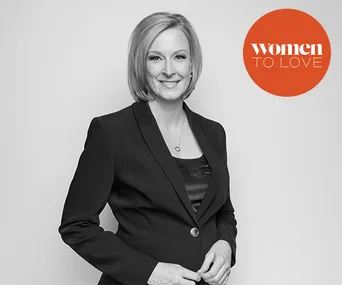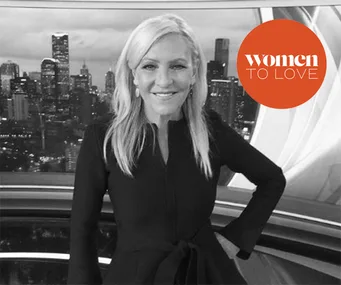Ros Moriarty is a Tassie girl who started out as a journalist with Radio Australia, covering indigenous affairs, women’s issues and the environment. After some time in government, she took a dramatic leap to co-found indigenous design business Balarinji with her husband John.
The name Balarinji might not be familiar, but their work definitely is. They’ve produced a stunning installation of Nespresso pods at the flagship Sydney store, projected designs onto the Opera House during Vivid, and, most notably, are the reason Qantas jets soar through the air emblazoned with indigenous artwork.
Twenty-five years after revolutionising the look of Australia’s most iconic brand, Ros has become an author and founded literacy programs for remote-region Aboriginal children and created a non-profit arm of Balarinji, a charity to relieve poverty and disadvantage amongst Australian Indigenous children and their families.
Previous winner of AFR’s 100 Women of Influence Awards, presented by Qantas, Ros stressed the importance of exploring the arts, looking for mentors who have deep competence rather than experience and not being afraid to change careers.
It can be hard to tell while you’re in the moment, but with the gift of hindsight, what would you say was the pivotal moment in your career?
Ten years after establishing our business Balarinji, I shot up in bed at 2am and thought, “We should cover a Qantas jumbo jet in Aboriginal art!” It seemed so perfect to have Australia’s best known brand flying—quite literally—the flag of Australia’s unique culture.
We didn’t have top level connections to Qantas though, so we couldn’t really just walk in and open the door to the CEO. We tried to get to anyone we knew even vaguely connected to Qantas. We did know the late Mick Young, who was on the Qantas board, so we talked to him about this huge idea, and overlayed our designs on posters given to us by a colleague’s husband who worked there.
We painted our pitches onto an actual 3D model of their plane, sent that in and honestly, just floundered about for 18 months hoping to get someone’s interest somewhere, which we eventually did.
It was a huge turning point for us and, as the managing director of an independent studio, having that idea to take to a really big corporate was definitely the light bulb moment for my career.
From writing books to managing an art company, you’ve dabbled far and wide career-wise. Do you have any advice for young women who aren’t really sure where they’re going with their career?
My majors at university were French and linguistics, I studied piano and then I ended up running a design company and being a creative director. I think any step along the way is not necessarily the pivotal direction, particularly now.
There was nothing in my background or my early jobs—which included stamping lids on malt cans in factories, working in restaurants as a student and then working in government for a while—that hinted I’d work in the field I do now.
I have adult kids in their 20s and 30s and like I told them, finding something you’re passionate about—whether or not it’s a commercial earner early—is really important.
I didn’t take a salary for eight years. When we started the business it was a philosophy, an idea, it wasn’t something that had commercial legs or a robust business plan—probably why I didn’t take a salary for 8 years. But it was an idea and a passion that we had the opportunity to design something that could influence Australian designers to see Aboriginal design as part of the national sense of identity.
Invest in yourself—in your education and your exposure. Experience life and experience the arts, as widely and as much as possible. Not just because it fosters the arts, but because it fosters the mind.
Creative minds think creative things.
Have you had any mentors throughout your life?
I actually find my mentors in women—often women, not always—who wouldn’t consider themselves to be mentors.
I started writing in 2007 and started being published in 2010 onwards, and the way my friend Mary—who has run bookstores in Melbourne for a very long time—worked with my books and supported me as an author was really a mentor relationship.
Likewise, Jodie—the woman who nominated me for these awards [The Australian Financial Review 100 Women of Influence Awards presented by Qantas]—would never consider herself a mentor, but her business acumen and sense of design have really influenced the way I think about things.
My daughter—who is 29 years old and doing a Masters of Screen Writing in LA—has been on my journey forever, obviously, and I find enormous inspiration in her. We soundboard a lot and I definitely see her as a mentor.
Even my own team. We have a really lateral construct at work and I have quite a young staff so I’m forever looking to their fresh ideas.
I think mentoring is not just someone who’s trod it all before, I think it’s someone who will challenge you on the way you think about something. I think it comes from a place of really deep competence and someone who’s really willing to share generously. They’re the best mentors.
You’ve mentioned you’re surrounded by a lot of women, something pretty typical of the creative industry. Do you still experience sexism, or do you find it’s lessened by your surroundings?
I definitely still experience it when dealing with bigger businesses at a senior level. Small businesses—because of their flexibility and independence—tend to attract more women. Balarinji, for instance, is about 70 per cent female-staffed. As a result, they normally have a terrific framework to work with.
However, in my interactions with larger corporations and large government departments, there are a noticeably higher number of men on boards. The progress to include women is far too slow and the subsequent impediments are real, they’re deep, and they’re ingrained.
We have a really long way to go before we lose that intergenerational sense that women don’t belong there. I know no one’s actually saying that out loud, but it’s still a fight. It’s so entrenched.
If you could tell your 13-year-old self anything, what would it be?
When I was 13 I was going to be a singer. That was my training and my development was classical. Obviously that’s not where I ended up, so I’d tell my younger self: Always be true to yourself.
I think I have been. I’m very happy with myself.
And be comfortable in your skin. Go for your passion and follow the dream. You live once so make it count.



